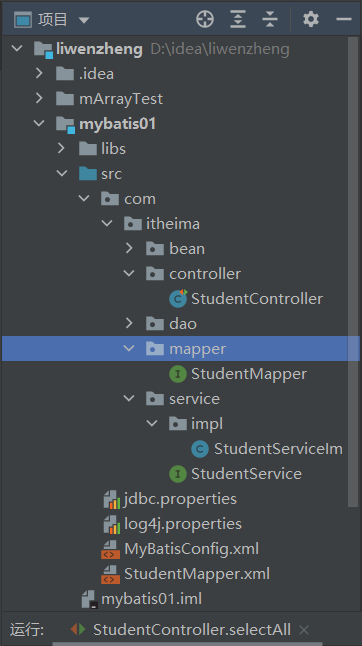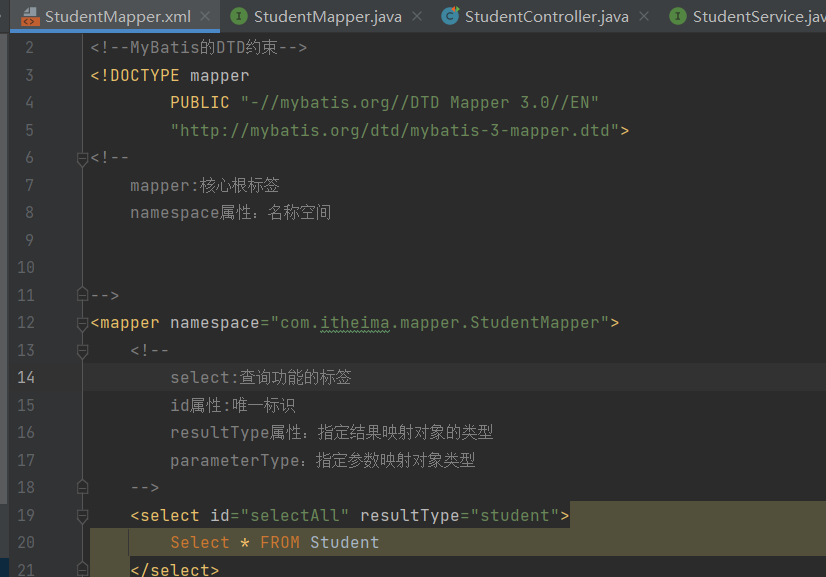MyBatis进阶--接口代理方式实现Dao 和动态SQL
MyBatis接口代理方式实现Dao层
接口代理方式-实现规则
传统方式实现Dao层,我们既要写接口。还要写实现类。而MyBatis框架可以帮助我们省略写Dao层接口实现类的步骤。程序员只需要编写接口,由MyBatis框架根据接口的定义来创
1该接口的动态代理对象。
实现规则:
1.映射配置文件中的名称空间必须和Dao层接口的全类名相同
2.映射配置文件中的增删改查标签的id属性必须和Dao层接口的方法名相同
3.映射配置文件中的增删改查标签的paramrterType属性必须和Dao层接口方法的参数相同
4.映射配置文件中的增删改查标签的resultType属性必须和Dao层接口方法的返回值相同
接口代理方式-代码实现
1.删除mapper层接口的实现类
2.修改映射配置文件
3.修改service层接口的实现类,采用接口代理方式实现功能

删除mapper层接口的实现类

修改映射配置文件
package com.itheima.service.impl; import com.itheima.bean.Student;
import com.itheima.mapper.StudentMapper;
import com.itheima.service.StudentService;
import org.apache.ibatis.io.Resources;
import org.apache.ibatis.session.SqlSession;
import org.apache.ibatis.session.SqlSessionFactory;
import org.apache.ibatis.session.SqlSessionFactoryBuilder; import java.io.IOException;
import java.io.InputStream;
import java.util.List;
/*
业务层实现类
*/
public class StudentServiceImpl implements StudentService { @Override
public List<Student> selectAll() {
List<Student> list = null;
SqlSession sqlSession = null;
InputStream is = null;
try{
//1.加载核心配置文件
is = Resources.getResourceAsStream("MyBatisConfig.xml"); //2.获取SqlSession工厂对象
SqlSessionFactory sqlSessionFactory = new SqlSessionFactoryBuilder().build(is); //3.通过工厂对象获取SqlSession对象
sqlSession = sqlSessionFactory.openSession(true); //4.获取StudentMapper接口的实现类对象
StudentMapper mapper = sqlSession.getMapper(StudentMapper.class); // StudentMapper mapper = new StudentMapperImpl(); //5.通过实现类对象调用方法,接收结果
list = mapper.selectAll(); } catch (Exception e) { } finally {
//6.释放资源
if(sqlSession != null) {
sqlSession.close();
}
if(is != null) {
try {
is.close();
} catch (IOException e) {
e.printStackTrace();
}
}
} //7.返回结果
return list;
} @Override
public Student selectById(Integer id) {
Student stu = null;
SqlSession sqlSession = null;
InputStream is = null;
try{
//1.加载核心配置文件
is = Resources.getResourceAsStream("MyBatisConfig.xml"); //2.获取SqlSession工厂对象
SqlSessionFactory sqlSessionFactory = new SqlSessionFactoryBuilder().build(is); //3.通过工厂对象获取SqlSession对象
sqlSession = sqlSessionFactory.openSession(true); //4.获取StudentMapper接口的实现类对象
StudentMapper mapper = sqlSession.getMapper(StudentMapper.class); // StudentMapper mapper = new StudentMapperImpl(); //5.通过实现类对象调用方法,接收结果
stu = mapper.selectById(id); } catch (Exception e) { } finally {
//6.释放资源
if(sqlSession != null) {
sqlSession.close();
}
if(is != null) {
try {
is.close();
} catch (IOException e) {
e.printStackTrace();
}
}
} //7.返回结果
return stu;
} @Override
public Integer insert(Student stu) {
Integer result = null;
SqlSession sqlSession = null;
InputStream is = null;
try{
//1.加载核心配置文件
is = Resources.getResourceAsStream("MyBatisConfig.xml"); //2.获取SqlSession工厂对象
SqlSessionFactory sqlSessionFactory = new SqlSessionFactoryBuilder().build(is); //3.通过工厂对象获取SqlSession对象
sqlSession = sqlSessionFactory.openSession(true); //4.获取StudentMapper接口的实现类对象
StudentMapper mapper = sqlSession.getMapper(StudentMapper.class); // StudentMapper mapper = new StudentMapperImpl(); //5.通过实现类对象调用方法,接收结果
result = mapper.insert(stu); } catch (Exception e) { } finally {
//6.释放资源
if(sqlSession != null) {
sqlSession.close();
}
if(is != null) {
try {
is.close();
} catch (IOException e) {
e.printStackTrace();
}
}
} //7.返回结果
return result;
} @Override
public Integer update(Student stu) {
Integer result = null;
SqlSession sqlSession = null;
InputStream is = null;
try{
//1.加载核心配置文件
is = Resources.getResourceAsStream("MyBatisConfig.xml"); //2.获取SqlSession工厂对象
SqlSessionFactory sqlSessionFactory = new SqlSessionFactoryBuilder().build(is); //3.通过工厂对象获取SqlSession对象
sqlSession = sqlSessionFactory.openSession(true); //4.获取StudentMapper接口的实现类对象
StudentMapper mapper = sqlSession.getMapper(StudentMapper.class); // StudentMapper mapper = new StudentMapperImpl(); //5.通过实现类对象调用方法,接收结果
result = mapper.update(stu); } catch (Exception e) { } finally {
//6.释放资源
if(sqlSession != null) {
sqlSession.close();
}
if(is != null) {
try {
is.close();
} catch (IOException e) {
e.printStackTrace();
}
}
} //7.返回结果
return result;
} @Override
public Integer delete(Integer id) {
Integer result = null;
SqlSession sqlSession = null;
InputStream is = null;
try{
//1.加载核心配置文件
is = Resources.getResourceAsStream("MyBatisConfig.xml"); //2.获取SqlSession工厂对象
SqlSessionFactory sqlSessionFactory = new SqlSessionFactoryBuilder().build(is); //3.通过工厂对象获取SqlSession对象
sqlSession = sqlSessionFactory.openSession(true); //4.获取StudentMapper接口的实现类对象
StudentMapper mapper = sqlSession.getMapper(StudentMapper.class); // StudentMapper mapper = new StudentMapperImpl(); //5.通过实现类对象调用方法,接收结果
result = mapper.delete(id); } catch (Exception e) { } finally {
//6.释放资源
if(sqlSession != null) {
sqlSession.close();
}
if(is != null) {
try {
is.close();
} catch (IOException e) {
e.printStackTrace();
}
}
} //7.返回结果
return result;
}
}
修改service层接口的实现类,采用接口代理方式实现功能
接口代理方式-源码分析
分析动态代理对象如何生成的?
通过动态代理开发的模式,我们只需要编写一个接口,不写实现类,我们通过getMapper()方法最终获取到
org.apache.ibatis.binding.MapperProxy代理对象,然后执行功能,而这个代理对象正是MyBatis使用了JDK的动态代理技术,帮助我们生成了代理实现类对象。从而可以进行相关持久化操作。
分析方法是如何执行的?
动态代理的实现类对象再执行方法的时候最终调用了maperMethod.execute()方法,这个方法中通过switch语句根据操作类型来判断是新增,修改,删除,查询操作,最后一步回到了MMyBatis最原生的SqlSession方式来执行增删改查。
接口代理方式小结
接口代理方式可以让我们只编写接口即可,而实现类对象由MyBatis生成。
实现规则:
1.映射配置文件中的名称空间必须和Dao层接口的全类名相同
2.映射配置文件中的增删改查标签的id属性必须和Dao层接口的方法名相同
3.映射配置文件中的增删改查标签的paramrterType属性必须和Dao层接口方法的参数相同
4.映射配置文件中的增删改查标签的resultType属性必须和Dao层接口方法的返回值相同
获取动态代理对象
SqlSession功能类中的getMapper()方法
删除mapper中的实现类 ,保留接口
在StudentMapper.xml中修改 <mapper namespace="com.itheima.mapper.StudentMapper">
更改service包下 StudentServiceImpl文件
package com.itheima.service.impl; import com.itheima.bean.Student;
import com.itheima.mapper.StudentMapper;
import com.itheima.service.StudentService;
import org.apache.ibatis.io.Resources;
import org.apache.ibatis.session.SqlSession;
import org.apache.ibatis.session.SqlSessionFactory;
import org.apache.ibatis.session.SqlSessionFactoryBuilder; import java.io.IOException;
import java.io.InputStream;
import java.util.List;
/*
业务层实现类
*/
public class StudentServiceImpl implements StudentService { @Override
public List<Student> selectAll() {
List<Student> list = null;
SqlSession sqlSession = null;
InputStream is = null;
try{
//1.加载核心配置文件
is = Resources.getResourceAsStream("MyBatisConfig.xml"); //2.获取SqlSession工厂对象
SqlSessionFactory sqlSessionFactory = new SqlSessionFactoryBuilder().build(is); //3.通过工厂对象获取SqlSession对象
sqlSession = sqlSessionFactory.openSession(true); //4.获取StudentMapper接口的实现类对象
StudentMapper mapper = sqlSession.getMapper(StudentMapper.class); // StudentMapper mapper = new StudentMapperImpl(); //5.通过实现类对象调用方法,接收结果
list = mapper.selectAll(); } catch (Exception e) { } finally {
//6.释放资源
if(sqlSession != null) {
sqlSession.close();
}
if(is != null) {
try {
is.close();
} catch (IOException e) {
e.printStackTrace();
}
}
} //7.返回结果
return list;
} @Override
public Student selectById(Integer id) {
Student stu = null;
SqlSession sqlSession = null;
InputStream is = null;
try{
//1.加载核心配置文件
is = Resources.getResourceAsStream("MyBatisConfig.xml"); //2.获取SqlSession工厂对象
SqlSessionFactory sqlSessionFactory = new SqlSessionFactoryBuilder().build(is); //3.通过工厂对象获取SqlSession对象
sqlSession = sqlSessionFactory.openSession(true); //4.获取StudentMapper接口的实现类对象
StudentMapper mapper = sqlSession.getMapper(StudentMapper.class); // StudentMapper mapper = new StudentMapperImpl(); //5.通过实现类对象调用方法,接收结果
stu = mapper.selectById(id); } catch (Exception e) { } finally {
//6.释放资源
if(sqlSession != null) {
sqlSession.close();
}
if(is != null) {
try {
is.close();
} catch (IOException e) {
e.printStackTrace();
}
}
} //7.返回结果
return stu;
} @Override
public Integer insert(Student stu) {
Integer result = null;
SqlSession sqlSession = null;
InputStream is = null;
try{
//1.加载核心配置文件
is = Resources.getResourceAsStream("MyBatisConfig.xml"); //2.获取SqlSession工厂对象
SqlSessionFactory sqlSessionFactory = new SqlSessionFactoryBuilder().build(is); //3.通过工厂对象获取SqlSession对象
sqlSession = sqlSessionFactory.openSession(true); //4.获取StudentMapper接口的实现类对象
StudentMapper mapper = sqlSession.getMapper(StudentMapper.class); // StudentMapper mapper = new StudentMapperImpl(); //5.通过实现类对象调用方法,接收结果
result = mapper.insert(stu); } catch (Exception e) { } finally {
//6.释放资源
if(sqlSession != null) {
sqlSession.close();
}
if(is != null) {
try {
is.close();
} catch (IOException e) {
e.printStackTrace();
}
}
} //7.返回结果
return result;
} @Override
public Integer update(Student stu) {
Integer result = null;
SqlSession sqlSession = null;
InputStream is = null;
try{
//1.加载核心配置文件
is = Resources.getResourceAsStream("MyBatisConfig.xml"); //2.获取SqlSession工厂对象
SqlSessionFactory sqlSessionFactory = new SqlSessionFactoryBuilder().build(is); //3.通过工厂对象获取SqlSession对象
sqlSession = sqlSessionFactory.openSession(true); //4.获取StudentMapper接口的实现类对象
StudentMapper mapper = sqlSession.getMapper(StudentMapper.class); // StudentMapper mapper = new StudentMapperImpl(); //5.通过实现类对象调用方法,接收结果
result = mapper.update(stu); } catch (Exception e) { } finally {
//6.释放资源
if(sqlSession != null) {
sqlSession.close();
}
if(is != null) {
try {
is.close();
} catch (IOException e) {
e.printStackTrace();
}
}
} //7.返回结果
return result;
} @Override
public Integer delete(Integer id) {
Integer result = null;
SqlSession sqlSession = null;
InputStream is = null;
try{
//1.加载核心配置文件
is = Resources.getResourceAsStream("MyBatisConfig.xml"); //2.获取SqlSession工厂对象
SqlSessionFactory sqlSessionFactory = new SqlSessionFactoryBuilder().build(is); //3.通过工厂对象获取SqlSession对象
sqlSession = sqlSessionFactory.openSession(true); //4.获取StudentMapper接口的实现类对象
StudentMapper mapper = sqlSession.getMapper(StudentMapper.class); // StudentMapper mapper = new StudentMapperImpl(); //5.通过实现类对象调用方法,接收结果
result = mapper.delete(id); } catch (Exception e) { } finally {
//6.释放资源
if(sqlSession != null) {
sqlSession.close();
}
if(is != null) {
try {
is.close();
} catch (IOException e) {
e.printStackTrace();
}
}
} //7.返回结果
return result;
}
}
创建dynamic下测试类Test01
package com.itheima.dynamic; import com.itheima.bean.Student;
import com.itheima.mapper.StudentMapper;
import org.apache.ibatis.io.Resources;
import org.apache.ibatis.session.SqlSession;
import org.apache.ibatis.session.SqlSessionFactory;
import org.apache.ibatis.session.SqlSessionFactoryBuilder;
import org.junit.Test; import java.io.IOException;
import java.io.InputStream;
import java.util.ArrayList;
import java.util.List; public class Test01 {
@Test
public void selectCondition() throws Exception {
InputStream is = Resources.getResourceAsStream("MyBatisConfig.xml"); SqlSessionFactory sqlSessionFactory = new SqlSessionFactoryBuilder().build(is); SqlSession sqlSession = sqlSessionFactory.openSession(true); StudentMapper mapper = sqlSession.getMapper(StudentMapper.class); Student stu=new Student();
stu.setId(2);
stu.setName("李四");
//stu.setAge(23);
List<Student> list = mapper.selectCondition(stu); for (Student student:list){
System.out.println(student);
}
sqlSession.close();
is.close();
}
@Test
public void selectByIds() throws Exception {
InputStream is = Resources.getResourceAsStream("MyBatisConfig.xml"); SqlSessionFactory sqlSessionFactory = new SqlSessionFactoryBuilder().build(is); SqlSession sqlSession = sqlSessionFactory.openSession(true); StudentMapper mapper = sqlSession.getMapper(StudentMapper.class); List<Integer> ids=new ArrayList<>();
ids.add(1);
ids.add(2);
List<Student> list = mapper.selectByIds(ids); for (Student student:list){
System.out.println(student);
}
sqlSession.close();
is.close();
}
}
MyBatis映射配置文件-----动态sql
动态SQL介绍
MyBatis映射配置文件中,前面我们的SQL都是比较简单的,有些时候业务逻辑复杂时,我们的SQL就时动态变化的,此时在前面学习的SQL就不能满足要求了。
多条件查询
id:3 name:王五 age:25
select * from Student where id=#{id} and name=#{name} and age=#{age}
id:3 name:王五
select * from Student where id=#{id} and name=#{name}
动态sql标签
<where>:条件标签。如果有动态条件,则使用该标签代替where关键字。
<if>:条件判断标签
<if test="条件判断">
查询条件拼接
</if>
<foreach>:循环遍历标签。适用于多个参数或者的关系。
<foreach collection="" open="" close="" item="" separator="">
获取参数
</foreach>
属性:
collection:参数容器类型,(list-集合,array-数组)。
open:开始的sql语句
close:结束额sql语句
item:参数变量名
separator:分隔符
Sql片段抽取
我们可以将一些重复的SQL语句进行抽取,以达到复用的效果
<sql>: 抽取SQL语句标签
<sql id ="片段唯一标识" >抽取的SQL语句</sql>
<include>:引入SQL片段标签
<include refid="片段唯一标识" />
StudentMapper.xml
<?xml version="1.0" encoding="UTF-8" ?>
<!--MyBatis的DTD约束-->
<!DOCTYPE mapper
PUBLIC "-//mybatis.org//DTD Mapper 3.0//EN"
"http://mybatis.org/dtd/mybatis-3-mapper.dtd">
<!--
mapper:核心根标签
namespace属性:名称空间 -->
<mapper namespace="com.itheima.mapper.StudentMapper">
<sql id="select">Select * FROM Student</sql>
<!--
select:查询功能的标签
id属性:唯一标识
resultType属性:指定结果映射对象的类型
parameterType:指定参数映射对象类型
-->
<select id="selectAll" resultType="student">
<include refid="select"/>
</select> <select id="selectById" resultType="student" parameterType="int">
<include refid="select"/> where id = #{id}
</select> <insert id="insert" parameterType="student">
Insert into Student values(#{id},#{name},#{age})
</insert> <update id="update" parameterType="student">
update Student set name =#{name},age=#{age} where id=#{id}
</update> <delete id="delete" parameterType="int">
delete from Student where id=#{id}
</delete>
<select id="selectCondition" resultType="student" parameterType="student">
<include refid="select"/>
<where>
<if test="id!=null">
id=#{id}
</if>
<if test="name!=null">
and name=#{name}
</if>
<if test="age!=null">
and age=#{age}
</if>
</where>
</select> <select id="selectByIds" resultType="student" parameterType="list">
<include refid="select"/>
<where>
<foreach collection="list" open="id in (" close=")" item="id" separator=",">
#{id}
</foreach>
</where>
</select> </mapper>
动态SQL小结
动态SQL指的就是SQL语句可以根据条件或者参数的不同进行动态的变化
<where>:条件标签
<if>:里面有个test标签可以帮我们进行判断
<foreach>:循环遍历的标签 collection="list" open="id in (" close=")" item="id" separator=","
<sql>:抽取SQL片段的标签
<include>:引入SQL片段的标签
MyBatis进阶--接口代理方式实现Dao 和动态SQL的更多相关文章
- Mybatis进阶学习笔记——动态代理方式开发Dao接口、Dao层(推荐第二种)
1.原始方法开发Dao Dao接口 package cn.sm1234.dao; import java.util.List; import cn.sm1234.domain.Customer; pu ...
- Mybatis的dao层实现 接口代理方式实现规范+plugins-PageHelper
Mybatis的dao层实现 接口代理方式实现规范 Mapper接口实现时的相关规范: Mapper接口开发只需要程序员编写Mapper接口而不用具体实现其代码(相当于我们写的Imp实现类) Mapp ...
- 分享公司DAO层动态SQL的一些封装
主题 公司在DAO层使用的框架是Spring Data JPA,这个框架很好用,基本不需要自己写SQL或者HQL就能完成大部分事情,但是偶尔有一些复杂的查询还是需要自己手写原生的Native SQL或 ...
- mybatis入门--mapper代理方式开发
不使用代理开发 之前,我们说了如何搭建mybatis框架以及我们使用mybatis进行简单的增删改查.现在,我们一起来构建一个dao层的完整代码.并用@test来模拟service层对dao层进行一下 ...
- spring整合mybatis(非代理方式)【我】
首先创建要给 maven 的war项目 不用代理的方式: 如果不适用Mapper代理的方式,配置就非常简单: 首先是pom文件(以下配置文件包含其他多余内容,仅供参考): <project xm ...
- MyBatis基础_连接池与事务、动态SQL、注解开发
一.MyBatis连接池及事务控制 1.连接池 在实际开发中,都会使用连接池,因为它可以减少获取连接缩消耗的时间.所谓连接池,就是存储数据库连接的容器.连接池中存储一定数量的数据库连接,当线程需要使用 ...
- Mybatis学习第三天——输入输出映射以及动态SQL
注意:以下传入数据与输出数据类型部分使用别名的方式,别名在SqlMapConfig.xml核心文件中配置 1.输入映射 1.1 传递简单数据类型 1.2 传递pojo中的类类型 1.3 传递Query ...
- mybatis源码学习(四):动态SQL的解析
之前的一片文章中我们已经了解了MappedStatement中有一个SqlSource字段,而SqlSource又有一个getBoundSql方法来获得BoundSql对象.而BoundSql中的sq ...
- mybatis --- 以接口的方式进行编程
); 我们来学习下接口方式的编程. 接口类IBookDao.java package com.mybatis.dao; import com.mybatis.model.Book; public i ...
随机推荐
- helm3.1安装及结合ceph rbd 部署harbor
[root@bs-k8s-ceph ~]# ceph -s cluster: id: 11880418-1a9a-4b55-a353-4b141e2199d8 health: HEALTH_WARN ...
- 1,turicreate入门 - jupyter & turicreate安装
turicreate入门系列文章目录 1,turicreate入门 - jupyter & turicreate安装 2,turicreate入门 - 一个简单的回归模型 3,turicrea ...
- [Fundamental of Power Electronics]-PART I-6.变换器电路-0 序
6 变换器电路 我们已经分析了包括buck,boost,buck-boost以及cuk电路,电压源逆变器等一系列电路的工作原理.利用这些变换器,可以执行许多不同的功能:降压,升压,极性反转以及直流交流 ...
- Dynamics CRM字段安全配置文件
在实施Dynamics CRM的过程中,有些需求会提到部分字段针对特殊的人员或者团队进行显示.更新以及创建的需求的控制.这里我们就需要用到字段安全性文件这个功能.此功能针对具体实体的字段进行配置可以达 ...
- Dynamics CRM使用JS隐藏自定义按钮
在我们平时客制化开发的时候会经常遇到要制作自定义按钮的情况,而这个自定义按钮的功能又经常会有一些隐藏逻辑需要实现,所以每次通过获取控件查找这个按钮再隐藏比较麻烦,而且偶尔会出现代码没起作用的效果.下面 ...
- MzzTxx——团队介绍
项目 内容 这个作业属于哪个课程 2021春季计算机学院软件工程(罗杰 任健) 这个作业的要求在哪里 团队项目-团队介绍 我在这个课程的目标是 提升工程能力和团队意识,熟悉软件开发的流程 这个作业在哪 ...
- XSS-change通关历程
Level1:没有过滤. <script>alert(1)</script> <svg/onload=alert(1)> <script>confirm ...
- day-5 xctf-when_did_you_born
xctf-when_did_you_born 题目传送门:https://adworld.xctf.org.cn/task/answer?type=pwn&number=2&grade ...
- ES6 第二天
三点运算符 <script type="text/javascript"> function func(...params){ params.forEach(funct ...
- 一.文件处理和json模块(容易混淆知识点即用法)
一.文件处理 注意点1: 打开文件包含两部分资源:操作系统级打开得文件+应用程序的变量. 在操作完毕一个文件时,必须把该文件的两部分资源一个不落的回收 如下: f.close() #回收操作系统级打开 ...
